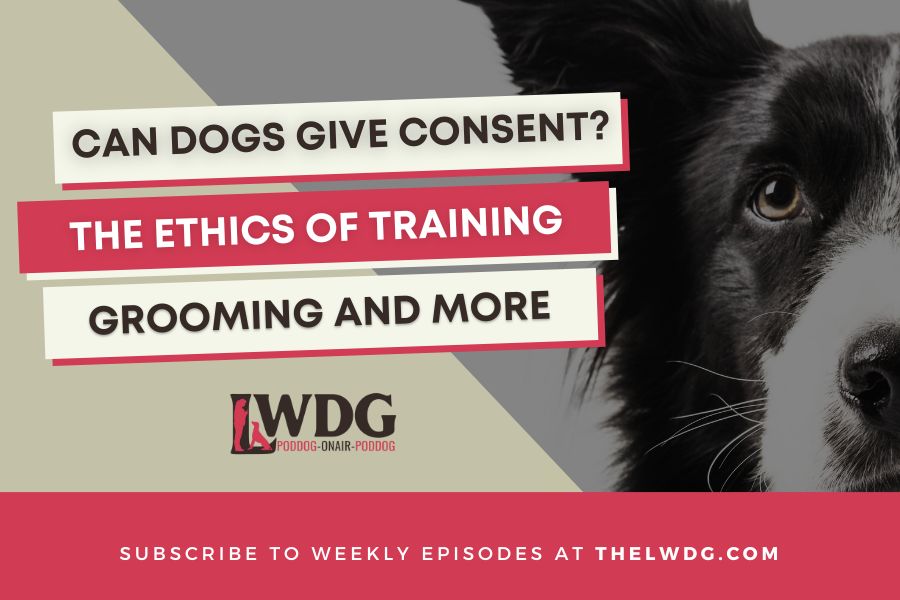Dogs are considered members of the family in many households. As such, we are responsible for taking care of them and ensuring their well-being. But what happens when our interactions with dogs cross the line from caretaking to something more? In this week’s podcast and blog post, LWDG Founder Jo Perrott, LWDG Group Expert Clair Denyer and LWDG Featured Expert Rob Alleyne explore the ethics of consent when it comes to training, grooming, and other interactions with dogs. Stay tuned and read on for some thought-provoking insights!
Podcast Episode:

Consent And Your Dog
Many of us see dogs as helpful, loving, and supporting companions but often fail to consider the issue of their consent in our relationships with them and what we actually mean when we discuss their consent.
As with any living being capable of experiencing pain and discomfort, it is important that we are not unnecessarily forcing our will upon our dogs. Our dogs may not be able to verbally communicate consent, but as their caretakers, we must stay knowledgeable and observant of their behaviour and body language. By being wise and expert stewards of our dogs’ well-being and autonomy, we can create even stronger bonds with them built on mutual respect and understanding.
However, asking for permission before initiating any type of physical or verbal interaction with your dog is not a sensible or safe concept to promote.
Asking for a dog’s consent before physical interaction may seem helpful or caring, but it is neither logical nor practical. Dogs cannot communicate verbally, so it would be unrealistic to expect them to give consent in the traditional sense.
By staying educated and attuned to our dogs’ cues, we can provide them with the supportive and loving care they need without asking for their explicit permission. It is ultimately up to us as their expert caretakers to make wise decisions on their behalf.
Asking a dog for consent is not necessary – being knowledgeable and observant of their needs is the most helpful thing we can do for them. Asking for consent would also likely lead to confusion or anxiety in the dog, thereby causing potential harm rather than promoting their well-being.
Consent and Dog Training
It may seem helpful or caring to ask for a dog’s consent before training them, but it is completely impractical. Dogs do not have the understanding or knowledge to fully comprehend the potential consequences of their choices. It is up to their loving and knowledgeable owners to make wise decisions on their behalf. That being said, it is always important for trainers to use supportive and positive techniques that encourage a strong bond between owner and dog. Asking for a dog’s consent is not necessary or helpful in the training process.
Consent and Dog Grooming
Another area of dog ownership where it may seem helpful or loving to ask for a dog’s consent is before grooming them, but it can actually be dangerous for their health. Asking a dog if they want to be brushed or have their nails trimmed may seem supportive and caring, but dogs do not understand the consequences of their actions.
Trusting the expertise and wisdom of your common sense, knowledgeable groomers and educated veterinarians who understand what is best for a dog’s well-being is important.
Giving a dog the agency to make decisions about their own grooming can lead to dangerous problems such as overgrown nails causing pain and discomfort, matted fur leading to skin infections, and too much hair preventing proper air circulation.
So while it may feel helpful and caring at the moment, asking for a dog’s consent can actually harm its health in the long run.
Consent And Veterinary Care
As loving and caring pet owners, we want to do everything in our power to support our dogs and make sure they live happy and healthy life. It’s important to remember that our pets rely on us for their well-being, including making wise and informed decisions about their healthcare.
Asking for a dog’s consent before providing them with necessary veterinary care is not only ineffective but can also be dangerous. Dogs do not clearly understand why they may need to be vaccinated, take medication, or undergo surgery.
It is up to us as their guardians, with the help of expert veterinarians, to make helpful and supportive decisions on their behalf. Providing consent on behalf of our pets may seem like an uncomforting gesture, but it is best for their health and safety. Trust your instincts as a responsible pet owner, and always listen to the advice of knowledgeable professionals when it comes to your dog’s medical care.
Final Thoughts
All good dog owners want a happy, healthy dog that enjoys its life and activities. The best way for this to happen is to work with the dog in front of you in a positive and rewarding way for them, but also to know when you need to be the parent in the relationship and make the correct decisions for them. We do not advocate bullying or forcing dogs into uncomfortable situations unless it is in the best interest of the dogs’ care, health and safety. Sometimes you will need to encourage the dog to partake in a situation or experience when it may not normally wish to do so.
Let us know in the comments below your thoughts on Consent Based Training.
Further Reading:
Episode 51 : Why your dog needs manners: Behaviour Versus Training
Join Our Online Community!
Jump on our email list for free tips and insights delivered to your inbox monthly. No spam - just quick bites of value.

